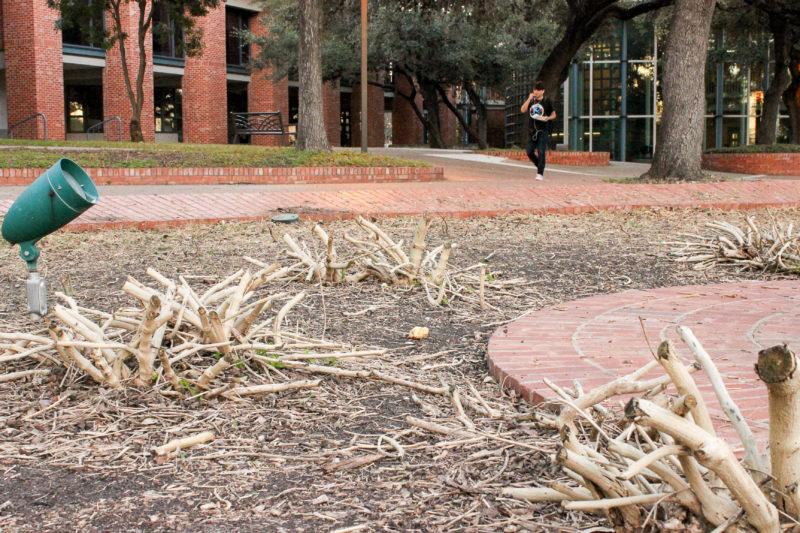Cold weather kills swathes of foliage across campus spots
Over winter break, temperatures in San Antonio dropped greatly. Though freezes are rare in South Texas, the low temperatures damaged many of the plants on campus.
Because of the expectation of extreme weather, Trinity makes plant selections that, for the most part, will be able to survive in such a climate. However, the number of plants that died left the community wondering why no action was taken to protect the plants.
“With few exceptions, our campus plant palette consists of primarily native or adapted plants that are known to be hardy in the San Antonio area. Because of the vast number of acres on campus, it is not feasible, not is it the intent, to cover plants as a residential homeowner might do,” said Leopoldo Vasquez, grounds supervisor.
Covering every plant on campus would be inefficient, both in terms of cost and labor, and it is much cheaper to replace the plants with newer ones instead.
“I think that covering plants is an attempt to create an artificial environment, and it’s a huge waste of labor,” said Richard Reed, professor of environmental studies.
More important than cost, some suggest that the plants that could not withstand the cold may not be the right species for our area. Selecting more native species may avoid too many plants dying.
“Maybe it protects plants that we shouldn’t have. In other words, if they can’t survive in our climate, maybe we shouldn’t be trying to propagate them,” Reed said.
It’s standard practice to plant annuals, plants that perform their life cycle within the span of a single growing season, and replace them with newer plants once they die. However, planting perennials, plants that live for many seasons, is more suitable.
“Ideally, you would plant perennials that are suited for this climate, so you wouldn’t have to replace them very often,” said Kelly Lyons, professor of biology.
There has been a shift of climate in South Texas, and because of it, winters may become more mild.
“Our climate is becoming more Mediterranean in a way where we have these really mild, wet winters. We’re seeing more Mediterranean species come in. We can get ahead of this as a university,” Lyons said.
Lyons suggests that the Trinity community become more focused on staying true to our region, and in doing so we will be able more easily to maintain the plant life on campus.
“What I would like to see happen here is that we begin to embrace place. Students are coming to school in South Texas; the school doesn’t have to look like New England,” Lyons said.
Though the freeze killed off many of the plants, Grounds Staffing is able to rejuvenate areas that have become overgrown from longer growing seasons.
“While the damage is certainly visible and unappealing at this time, we have every expectation that most, if not all, plants that are showing damage will rebound in the upcoming weeks and months, and that the Trinity campus will continue to remain one of the most beautiful campuses in all of Texas,” Vasquez said.







